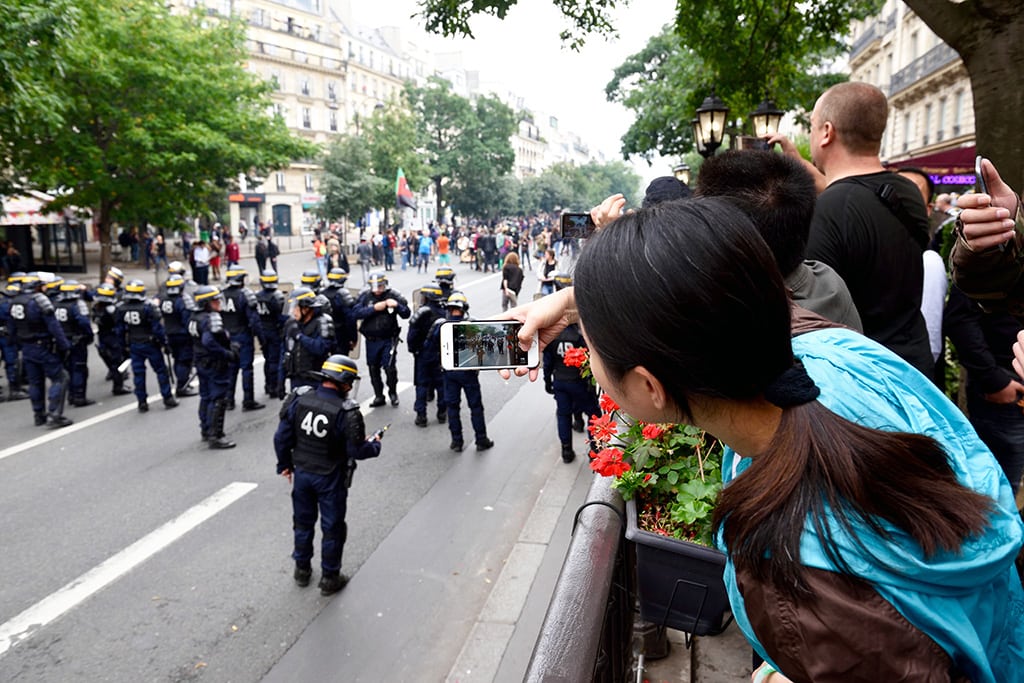Skift Take
In early summer when it's just about leisure tourists, this may fly. But it's no longer summer in Paris, and it's no longer about leisure travel.
Efforts by Paris tourism officials to re-establish the city’s reputation as a safe place to visit took another step backward on Thursday.
French citizens opposed to the government’s plan to change the country’s labor laws, which would in part make it easier for employers to lay off workers and pay less overtime, once again clashed with police at the conclusion of a march in Paris. Since February, more than a dozen protests have been organized by labor unions, leftist groups and students, and almost all have included brawls between police and opponents of the new labor law.
But on Thursday, the violence appeared to reach a new level. Police charged protesters dozens of times thwacking many with their batons as demonstrators threw rocks and bottles at the officers. At least two policemen suffered burns after masked protesters struck them with Molotov cocktails — glass bottles filled with a flammable liquid and rigged to burst into flames when thrown and broken. On the other side, one man suffered a serious eye injury after police threw a flash-bang grenade into a crowd of demonstrators.
And the whole ugly scene played out in front of scores of spooked tourists as well as members of the international news media. It might be an understatement but these are not the kind of images Paris needs the world to see after a 20-month span that saw the city rocked by multiple terrorist attacks, crippling labor strikes and even a flood. Just last week, police said they foiled a plot to possibly blow up Notre Dame Cathedral and a Paris train station. To put a fine point on the dangerous climate, government’s leaders say they expect more attacks. That acknowledgement and now the bloody street protest come at the worst time for France’s tourism sector: just as the all-important annual convention season is getting underway.
From September to November, scores of business travelers descend on the City of Light to attended one of the many trade shows, such as Map Pro, one of the travel sector’s big conventions; the Paris Motor Show; and Comic Con Paris. Some in the tourism industry are counting on the conventions this year to provide a badly needed shot in the arm.
“(Business) is picking up again,” said an employee working the front desk on Wednesday at the Hotel d’Angelterre, a three-star Parisian hotel located close to the Louvre museum. “It was slow in August, real slow.”
How slow? The man, who declined to give his name because he’s not authorized to speak for the hotel, said August revenues were 30-percent below the same period last year. That’s consistent with some of the data that’s coming in. According to market researchers MKG Group, revenue per available hotel room in Paris between July 1 and Aug. 20 fell 21.2 percent.
Those aren’t official numbers but nearly everyone expects the final tally for August in Paris and parts of southern France to be way down due to the July terrorist attack in Nice, when a suspected Jihadist deliberately drove a truck into holiday crowds and killed 86 people.
The travel and tourism sector in Paris said earlier this year that the terrorist attacks have scared away a slew of guests and cost them about 750 million euros in lost revenue. On Tuesday, Jean-Marc Ayrault, France’s foreign minister, made big news in tourism circles by announcing the government would contribute 10 million euros to a campaign to promote the country internationally instead of the 1.5 million euros it originally planned to give.
Perhaps more significant than the money itself is the message it sends, said Alexandra van Weddingen, director of corporate communications for Galeries Laffayette, a Paris department store popular with overseas guests.
“It was definitely a good move,” van Weddingen said Wednesday. “It’s a good way to really promote the image of France. We can really feel that the government is totally conscious of what is at stake here and they know the importance of focusing efforts on this.”
Ongoing Worries
What’s at stake is one of France’s most important drivers of the country’s economy. France is the most visited country in the world. It saw just under 85 million visitors last year and tourism accounts for about 7 percent of the country’s gross domestic product. The sector employs an estimated 2 million employees.
But all these efforts to fortify tourism here won’t mean much if there are more terrorist attacks. Or if the images broadcast from Paris’ streets continue to be full of violence.
One move that officials can make to help with ongoing street demonstrations is to move them to places less frequented by tourists, such as Place d’italie or Place de la Nation.
On Thursday, as protesters marched from Bastille, the birthplace of the French Revolution, to the Square at Republique, groups of tourists, presumably from the many nearby hotels, seemed to enjoy the spectacle. Some were seen recording the events with their mobile phones.
Of course, that was before they got their first whiff of tear gas or before a squad of police in riot gear screamed at them to move across the street or before some of them ventured too close to the square when a disbursement grenade went off–causing a small but scary stampede among protesters.
Hoteliers and guides in Paris might do well to caution customers that these protests are not a tourist attraction.
The Daily Newsletter
Our daily coverage of the global travel industry. Written by editors and analysts from across Skift’s brands.
Have a confidential tip for Skift? Get in touch
Photo credit: Tourists watching police and protesters in central Paris, whose tourism suffered this summer, on September 15, 2016. Greg Sandoval / Skift
